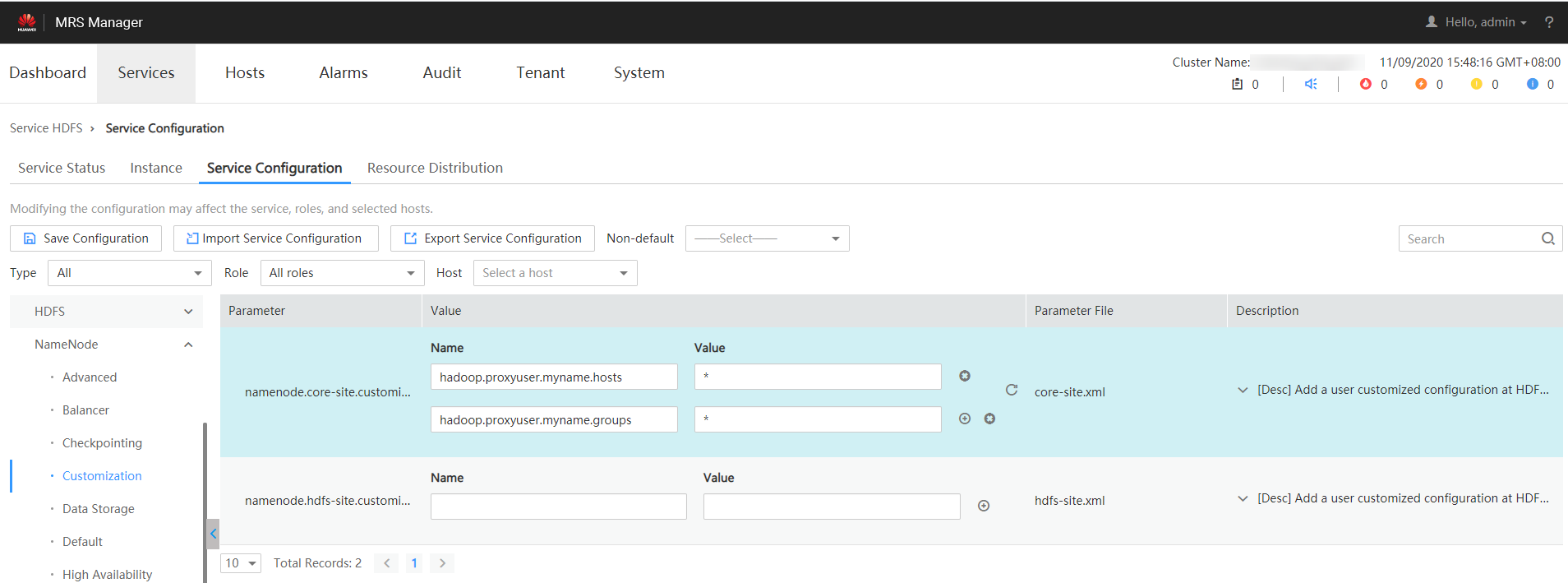File System Sink Stream (Recommended)
Function
You can create a sink stream to export data to a file system such as HDFS or OBS. After the data is generated, a non-DLI table can be created directly according to the generated directory. The table can be processed through DLI SQL, and the output data directory can be stored in partitioned tables. It is applicable to scenarios such as data dumping, big data analysis, data backup, and active, deep, or cold archiving.
OBS is an object-based storage service. It provides massive, secure, highly reliable, and low-cost data storage capabilities.
Syntax
1 2 3 4 5 6 7 8 9 |
CREATE SINK STREAM stream_id (attr_name attr_type (',' attr_name attr_type)* ) [PARTITIONED BY (attr_name (',' attr_name)*] WITH ( type = "filesystem", file.path = "obs://bucket/xx", encode = "parquet", ak = "", sk = "" ); |
Keywords
|
Parameter |
Mandatory |
Description |
|---|---|---|
|
type |
Yes |
Output stream type. If type is set to filesystem, data is exported to the file system. |
|
file.path |
Yes |
Output directory in the form: schema://file.path. Currently, Schema supports only OBS and HDFS.
|
|
encode |
Yes |
Output data encoding format. Currently, only the parquet and csv formats are supported.
|
|
ak |
No |
Access key. This parameter is mandatory when data is exported to OBS. Global variables can be used to mask the access key used for OBS authentication. For details about how to use global variables on the console, see the Data Lake Insight User Guide. |
|
sk |
No |
Secret access key. This parameter is mandatory when data is exported to OBS. Secret key for accessing OBS authentication. Global variables can be used to mask sensitive information. For details about how to use global variables on the console, see the Data Lake Insight User Guide. |
|
krb_auth |
No |
Authentication name for creating a datasource connection authentication. This parameter is mandatory when Kerberos authentication is enabled. If Kerberos authentication is not enabled for the created MRS cluster, ensure that the /etc/hosts information of the master node in the MRS cluster is added to the host file of the DLI queue. |
|
field_delimiter |
No |
Separator used to separate every two attributes. This parameter needs to be configured if the CSV encoding format is adopted. It can be user-defined, for example, a comma (,). |
Precautions
- To ensure job consistency, enable checkpointing if the Flink job uses the file system output stream.
- To avoid data loss or data coverage, you need to enable automatic or manual restart upon job exceptions. Enable the Restore Job from Checkpoint.
- Set the checkpoint interval after weighing between real-time output file, file size, and recovery time, such as 10 minutes.
- Two modes are supported.
- At least once: Events are processed at least once.
- Exactly once: Events are processed only once.
- When you use sink streams of a file system to write data into OBS, do not use multiple jobs for the same directory.
- The default behavior of an OBS bucket is overwriting, which may cause data loss.
- The default behavior of the OBS parallel file system bucket is appending, which may cause data confusion.
You should carefully select the OBS bucket because of the preceding behavior differences. Data exceptions may occur after abnormal job restart.
HDFS Proxy User Configuration
- Log in to the MRS management page.
- Select the HDFS NameNode configuration of MRS and add configuration parameters in the Customization area.
Figure 1 HDFS service configuration

In the preceding information, myname in the core-site values hadoop.proxyuser.myname.hosts and hadoop.proxyuser.myname.groups is the name of the krb authentication user.

Ensure that the permission on the HDFS data write path is 777.
- After the configuration is complete, click Save.
Example
- Example 1:
The following example dumps the car_info data to OBS, with the buyday field as the partition field and parquet as the encoding format.
1 2 3 4 5 6 7 8 9 10 11 12 13
create sink stream car_infos ( carId string, carOwner string, average_speed double, buyday string ) partitioned by (buyday) with ( type = "filesystem", file.path = "obs://obs-sink/car_infos", encode = "parquet", ak = "{{myAk}}", sk = "{{mySk}}" );
The data is ultimately stored in OBS. Directory: obs://obs-sink/car_infos/buyday=xx/part-x-x.
After the data is generated, the OBS partitioned table can be established for subsequent batch processing through the following SQL statements:
- Create an OBS partitioned table.
1 2 3 4 5 6 7 8
create table car_infos ( carId string, carOwner string, average_speed double ) partitioned by (buyday string) stored as parquet location 'obs://obs-sink/car_infos';
- Restore partition information from the associated OBS path.
1alter table car_infos recover partitions;
- Create an OBS partitioned table.
- Example 2:
The following example dumps the car_info data to HDFS, with the buyday field as the partition field and csv as the encoding format.
1 2 3 4 5 6 7 8 9 10 11 12
create sink stream car_infos ( carId string, carOwner string, average_speed double, buyday string ) partitioned by (buyday) with ( type = "filesystem", file.path = "hdfs://node-master1sYAx:9820/user/car_infos", encode = "csv", field_delimiter = "," );
The data is ultimately stored in HDFS. Directory: /user/car_infos/buyday=xx/part-x-x.
Feedback
Was this page helpful?
Provide feedbackThank you very much for your feedback. We will continue working to improve the documentation.See the reply and handling status in My Cloud VOC.
For any further questions, feel free to contact us through the chatbot.
Chatbot





